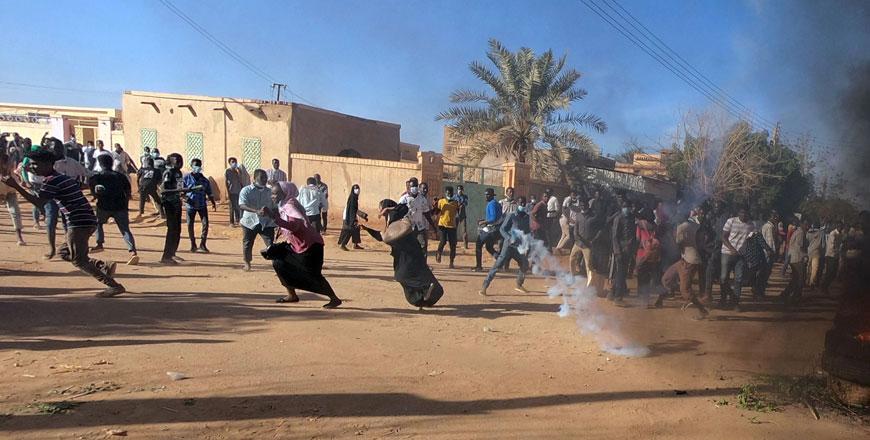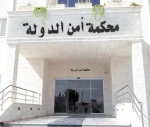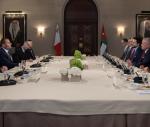You are here
Qatar emir visits Sudan at time of Gulf tensions
By AFP - Apr 02,2014 - Last updated at Apr 02,2014
KHARTOUM — Qatar’s emir held talks in Sudan on Wednesday at a time of strained ties with his country’s Gulf neighbours over its perceived support for the Egypt-based Muslim Brotherhood.
Sheikh Tamim Bin Hamad Al Thani was greeted at Khartoum airport by Sudan’s President Omar Bashir, for what an analyst called a meeting of two regionally isolated regimes.
The leaders held talks at a conference centre along the Blue Nile before Sheikh Tamim left Khartoum after a visit of around three hours.
His stop coincided with unprecedented tensions between Doha and other Gulf states over the widely banned Muslim Brotherhood.
The Sudanese regime, which took power 25 years ago in an Islamist-backed coup, is essentially based on support from the Brotherhood, said Safwat Fanous, a political scientist at the University of Khartoum.
He told AFP that the emir’s visit appears aimed to “break the isolation” of Qatar from its Gulf neighbours and Egypt.
Sheikh Tamim, in a written statement, said his trip would confirm the “continuous joint consultations” between the two countries on regional developments.
The visit also aimed to support “brotherly relations” between people of both nations, he said.
Qatar has been a key backer of Sudan’s government, which is “in desperate need of foreign direct investment”, said Khalid Tigani, chief editor of the Elaff economic weekly.
After the emir’s departure, Sudan’s Finance Minister Badraldin Mahmoud Abbas told reporters that Qatar will provide Sudan with $1 billion to help boost its reserves of hard currency.
Terms of the arrangement were not disclosed.
Qatar also agreed to finance energy and agricultural projects, Abbas said, describing the investments as “huge”.
South Sudan separated in 2011, taking with it the majority of Sudan’s oil production, which accounted for billions of dollars in export earnings.
Since then the Sudanese pound has plunged in value on the black market and inflation has soared.
Diplomatic and other sources said last month that major European and Saudi banks had stopped dealing with Sudan, adding to the sanctions-hit state’s isolation and further straining its cash-starved economy.
Khartoum says the banks are under increased pressure from the United States, which has a 17-year-old trade embargo against Sudan.
Ties between Doha and Khartoum, meanwhile, “are witnessing rapid progress”, foreign ministry spokesman Abubakr Al Siddiq said, quoted by the official SUNA news agency.
Sudanese officials last month said Qatar was providing an unprecedented $135 million to support Sudan’s rich but under-developed archaeological heritage.
Qatar also hosted talks which led to the 2011 Doha Document for Peace in Darfur between Khartoum and rebel splinter groups in the western region of Sudan, where violence has worsened this year.
“This agreement didn’t bring peace to Darfur,” said Fanous of the University of Khartoum. “I think the Qatar role in Darfur is shrinking.”
In early March, Saudi Arabia, the United Arab Emirates and Bahrain recalled their ambassadors from Qatar, a fellow Gulf Cooperation Council member.
Doha supported Egypt’s Islamist president Mohamed Morsi, a former Brotherhood leader, while most Gulf countries hailed Morsi’s overthrow by the army last July and pledged billions of dollars in aid.
Before his ouster as president, Morsi made what Bashir’s regime called a “historic” visit to Khartoum.
Morsi and Sheikh Tamim are among the rare heads of state to visit Sudan, whose leader Bashir is wanted by the International Criminal Court in The Hague for alleged war crimes in Darfur.
Related Articles
Sudan turned down an Iranian offer to set up air defences on its Red Sea coast after a 2012 air strike Khartoum blamed on Israel, fearing they would upset Iran’s regional rival Saudi Arabia, Sudan’s foreign minister was quoted as saying on Thursday.
Qatar’s Emir Sheikh Tamim Bin Hamad Al Thani arrived in Jeddah on Tuesday to meet Saudi Arabia’s King Abdullah, Doha-based Al Jazeera television reported, without giving details of what they planned to discuss.
KHARTOUM — Sudanese President Omar Al Bashir left Tuesday for a two-day visit to Qatar, state media reported, in what is his first trip abro















